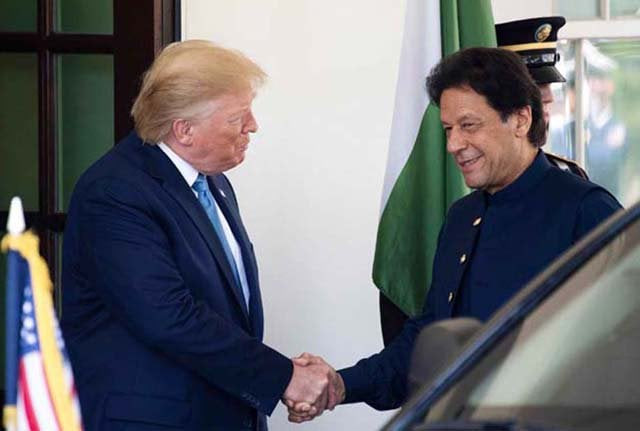Re-assessing Pakistan-US centrality
The solution lies in recalibrating counterterrorism which is possible if Pakistan-US security cooperation continues

US President Donald Trump and Prime Minister Imran Khan. PHOTO: FILE
First, both powers have forged economic partnerships with countries of their choosing. The Trump and Modi leaderships have been at the centre of a robust Indo-US economic alliance. Bilateral trade crossed $142 billion in 2018, long considered to be en route to the $500 billion mark.
Pakistan on the other hand has resisted its historic reliance on US aid, and chosen to immerse itself in a multi-billion dollar economic partnership with its iron-ally, China. Naturally, a bulk of the cooperation centres on the $62 billion China-Pakistan Economic Corridor (CPEC) whose potential to generate returns is deemed inevitable by both Chinese and Pakistani officials.
In the light of Islamabad and Washington’s shifting economic trajectories, a favourable recognition of each other’s independent pursuits becomes vital for a regional engagement. Washington must acknowledge the Pakistan-China alliance in the same light as the Indo-US economic partnership itself, if the end goal is to prioritise future Pak-US cooperation in South Asia.
Second, both Pakistan and the US desire a political settlement to the Afghan conflict, and remain primary stakeholders in its outcome. Islamabad has served as a “fallback option” for Washington each time talks between the Afghan Taliban and the US have undergone friction. For instance, Islamabad’s decision to host the Taliban after the Camp David fallout provides strong evidence of the Taliban’s receptivity to Pakistan’s reconciliation call. The move also set the groundwork for Mr Trump’s latest advance towards Kabul, aimed at reviving the Taliban-US peace talks. Hence, Pakistan’s decades-long familiarity with the Taliban — coupled with American backchannel diplomacy — confirms the relationship as indispensable to Afghan peace and regional stability.
Third, divergent counterterrorism positions — including limited US operations against anti-Pakistan militias in eastern Afghanistan — make cooperation between Pakistan and the US evermore pivotal. The Trump administration has made it very clear that it wishes to eliminate all present and future militant outfits within South Asia. However, Washington shows no signs of accelerating crackdowns against Afghan-based Islamist groups that continue to target military and civilian facilities in Pakistan, especially Jamaat Ul Ahrar.
There is also a routine perception in Washington that Islamabad’s domestic counterterrorism measures identify as fiction and that no degree of Pakistani cooperation will ever prove adequate. In fact, the Trump administration continues to cite Pakistan as a major player for South Asian peace, while simultaneously dismissing its contributions — in both blood and treasure — to the very same counterterrorism cause. Numerous testimonies by US experts to the Congress see to this contradiction, one which with every passing speech is becoming difficult for the Trump administration to conceal.
The solution lies in recalibrating counterterrorism priorities which is only possible if the Pakistan-US security cooperation continues uninterrupted in the region.
Ultimately, shifting economic alliances, joint pursuits for peace in Afghanistan, and differing counterterrorism positions are likely to sustain Pakistan-US centrality to South Asian stability. Undermining the relationship could not only compound existing challenges, but potentially starve the region of a viable alternative.
Published in The Express Tribune, November 6th, 2019.
Like Opinion & Editorial on Facebook, follow @ETOpEd on Twitter to receive all updates on all our daily pieces.















COMMENTS
Comments are moderated and generally will be posted if they are on-topic and not abusive.
For more information, please see our Comments FAQ